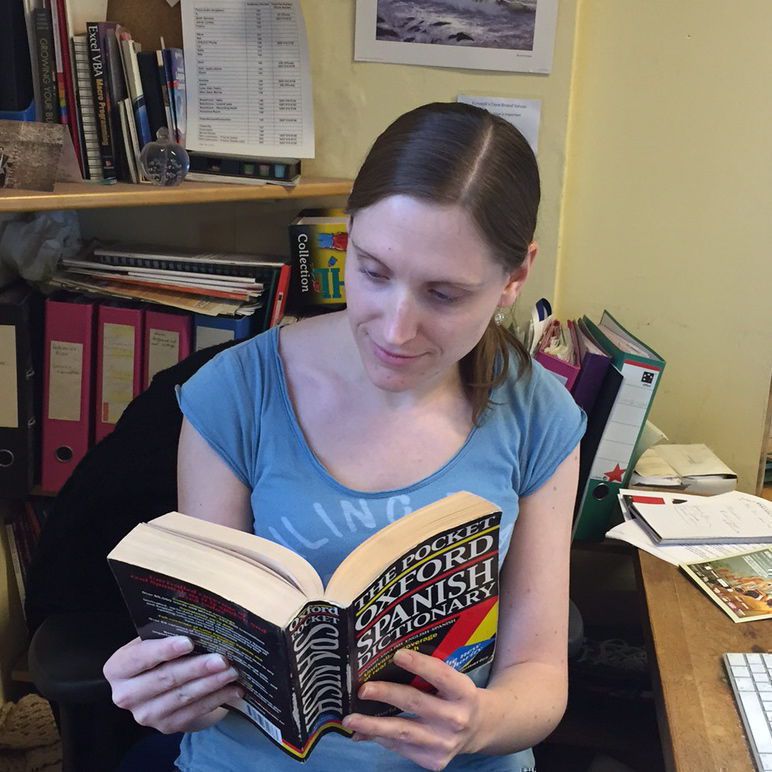How do you know when you’re fluent in another language?
The other day, in a moment of idle curiosity, I took an online Spanish test. And it went rather well; when I finished, I was told that I was 87% fluent.
This is very funny, because – to my shame – I haven’t spoken Spanish properly for years. And although the test proved that everything I learnt at school and university is still there in my head, I know the next time I do try and have a conversation, I’ll struggle initially to remember the right words and how to construct sentences correctly. And there’ll definitely be a lot of ‘um’ and ‘er’.
Defining yourself as ‘fluent’ or ‘not’ seems like a simple enough task. Personally, I’d define fluency as the moment you’re able to have a conversation in another language without hesitation, just as you would in your own native language.
But is that setting too high a standard for myself? Surely what I’ve just described is one step on – what we would call native level?
So, I asked a few other EuroTalkers how they define fluency. A couple of responses were very much like mine:
“When you’re able to have a conversation (spoken or written) without making mistakes, without having to pause to think about words and grammar and without referring to a dictionary or other ‘cheat-sheets’. Be able to use the more complex features of a language with ease (e.g. conditionals, obscure tenses).”
“Speaking another language without having to think about it.”
While a couple were willing to be a bit more flexible:
“When you have enough of the language to get through a visit to the country, you can understand a local and they can understand you back when you speak their language.”
“I think minor mistakes are permitted as long as the other one understands you.”
And another one came at the question from an angle I’d never considered:
“You’re able to have any conversation about general knowledge, not specific fields like medicine, for example.”
But there was one thing all the answers seemed to have in common: the key to fluency is confidence, whether you know all the words or not. And that’s why I can’t think of myself as 87% fluent in Spanish; yes, I understand how the subjunctive works, and perhaps I’d even say that I can read the language fluently – but that doesn’t mean I can confidently have a conversation with someone about the weather.
What do you think ‘fluent’ means? Are you fluent in any other languages?
Liz
5 reasons NOT to learn a language
Yes, you did read that correctly. We’re always telling you why learning a language is one of the best things you can do – so today, we’re examining a few of the main reasons why people choose not to do it. How many of these do you recognise?
1. I’m not good at languages
We’ve all said this at some point. What it really means is ‘I didn’t do well at languages at school, so I must be bad at them.’ (Remember that time in Spanish class when you accidentally said you were pregnant when you meant embarrassed, and everyone laughed? Nightmare.)
But we all learn differently and at school, we were only taught one way. So maybe it’s just that you haven’t found the right way for you yet…
2. I can’t afford it
Learning a language doesn’t need to cost a fortune. You could read newspapers online in the language you’re learning. Or find a friend to chat to, either in person or via Skype. If you’re a creative type, make yourself some flashcards and use them to practise your vocabulary.
For more tips, visit Alex’s article on learning a language on a budget. And check out our special offer at the end of this email…
3. I don’t need to learn a language
This is one that’s often heard among English speakers: ‘But everyone speaks English!’ (Apparently 33% of Brits think speaking English with a foreign accent is the answer. It really isn’t.)
And while it might be true that a lot of people now speak English, that doesn’t mean we should stop making the effort. By knowing just a few words like hello and thank you, we show respect and probably end up having a better experience as a result.
4. I haven’t got time
We all lead busy lives, and it can be hard to find time to do everything we want to do. But learning a language doesn’t have to mean studying for hours on end. Break it up into small, manageable tasks and fit it around your daily life – on the bus to work, for instance, or waiting for a meeting to start. You may be surprised how much time you actually have.
For more advice, check out our blog post on making time to learn a language.
5. I’m too old to learn a language
You’re never too old. It may be true that children’s brains are better suited to picking up new languages, but it doesn’t necessarily follow that adults can’t do it. Just look at Benny Lewis, who hated languages at school and now speaks seven fluently. If he can do it, why not the rest of us?
So let’s stop making excuses and start learning a language now; in a year’s time we’ll be glad we did…
Don’t give up: New Year’s Resolutions
We’re now a week and a half into the New Year, and it’s safe to say a lot of people will already have given up on the promises they made to themselves when the clock struck midnight on January 1st. Whether you’re trying to lose weight, quit smoking, learn a new skill or save money, here are our tips to help you stick with it.
1. Set yourself manageable goals. Instead of saying ‘I’m going to lose weight’, decide how much you want to lose in a set time frame, and reward yourself when you get there.
2. Focus – don’t try and do everything at once. Choose one or two changes you want to make to your life and concentrate on those.
 3. Write your resolutions down. Seeing them in black and white will help you to establish exactly what you want to achieve.
3. Write your resolutions down. Seeing them in black and white will help you to establish exactly what you want to achieve.
4. Only set targets that you really care about. If it’s not important to you, it’s so much easier to lose interest. Think about why you’re doing it – if you can’t think of a reason, it’s probably not worth doing.
5. Tell friends and family what you want to achieve. It’ll be harder to give up if other people are keeping an eye on you.
6. If you do have a wobble, don’t use that as an excuse to give up. Put it down as a one-off and start again.

7. Take your time. You don’t have to achieve all your goals on the first day. If your goal is to exercise more, start by going for a run to see how you feel, before you rush out and spend lots of money on a gym membership.
If you didn’t set any New Year’s Resolutions this year, it’s not too late! If you want to make some changes in your life, you don’t have to wait for January 1st to roll around again. Why not make a start today?
Learning a language is often a popular New Year’s Resolution, so if you’ve decided 2013 is the year to brush up on your German, or start learning Japanese, have a look at our website to see how we can help you get started.
Good luck!



